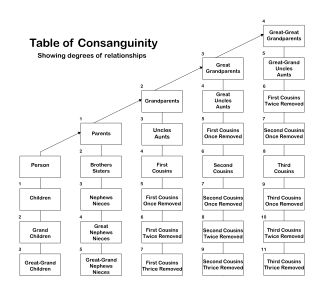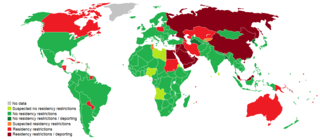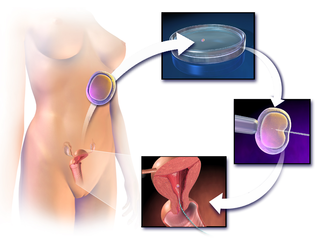
Population typically refers to the number of people in a single area, whether it be a city or town, region, country, or the world. Governments typically quantify the size of the resident population within their jurisdiction using a census, a process of collecting, analysing, compiling, and publishing data regarding a population.

Family planning is "the ability of individuals and couples to anticipate and attain their desired number of children and the spacing and timing of their births. It is achieved through use of contraceptive methods and the treatment of involuntary infertility." Family planning may involve consideration of the number of children a woman wishes to have, including the choice to have no children and the age at which she wishes to have them. These matters are influenced by external factors such as marital situation, career considerations, financial position, and any disabilities that may affect their ability to have children and raise them. If sexually active, family planning may involve the use of contraception and other techniques to control the timing of reproduction.
Genetic counseling is the process of investigating individuals and families affected by or at risk of genetic disorders to help them understand and adapt to the medical, psychological and familial implications of genetic contributions to disease; this field is considered necessary for the implementation of genomic medicine. The process integrates:

Consanguinity is the characteristic of having a kinship with another person.

HIV-positive people, seropositive people or people who live with HIV are people who have the human immunodeficiency virus HIV, the agent of the currently incurable disease AIDS.
The United Nations coordinated an International Conference on Population and Development (ICPD) in Cairo, Egypt, on 5–13 September 1994. Its resulting Programme of Action is the steering document for the United Nations Population Fund (UNFPA).

Assisted reproductive technology (ART) includes medical procedures used primarily to address infertility. This subject involves procedures such as in vitro fertilization (IVF), intracytoplasmic sperm injection (ICSI), cryopreservation of gametes or embryos, and/or the use of fertility medication. When used to address infertility, ART may also be referred to as fertility treatment. ART mainly belongs to the field of reproductive endocrinology and infertility. Some forms of ART may be used with regard to fertile couples for genetic purpose. ART may also be used in surrogacy arrangements, although not all surrogacy arrangements involve ART. The existence of sterility will not always require ART to be the first option to consider, as there are occasions when its cause is a mild disorder that can be solved with more conventional treatments or with behaviors based on promoting health and reproductive habits.

Sexual and reproductive health (SRH) is a field of research, healthcare, and social activism that explores the health of an individual's reproductive system and sexual wellbeing during all stages of their life.

Gangarampur is one of the cities and a municipality in Dakshin Dinajpur district in the state of West Bengal, India. Buniadpur is the headquarters of the Gangarampur subdivision. The city is located on the bank of river Punarbhaba. Gangarampur is one of the major cities connected through National Highway 512. It became the subdivision of newly formed district Dakshin Dinajpur when Paschim Dinajpur was bifurcated into Uttar and Dakshin Dinajpur in 1992. In ancient time people often call the city Damdama or Devkot.

EngenderHealth is a 501(c)(3) nonprofit organization based in Washington, D.C., active in women's health and sexual and reproductive health (SRH) operating in nearly 20 countries Africa, Asia, and the Americas. The organization was established in 1943 and provided access to voluntary surgical contraception in the United States during its first 25 years. It has since expanded its mission to "training health care professionals and partnering with governments and communities to make high-quality family planning and sexual and reproductive health services available-today" and in the future.

HIV/AIDS in Lesotho constitutes a very serious threat to Basotho and to Lesotho's economic development. Since its initial detection in 1986, HIV/AIDS has spread at alarming rates in Lesotho. In 2000, King Letsie III declared HIV/AIDS a natural disaster. According to the Joint United Nations Programme on HIV/AIDS (UNAIDS) in 2016, Lesotho's adult prevalence rate of 25% is the second highest in the world, following Eswatini.

Rwanda faces a generalized epidemic, with an HIV prevalence rate of 3.1 percent among adults ages 15 to 49. The prevalence rate has remained relatively stable, with an overall decline since the late 1990s, partly due to improved HIV surveillance methodology. In general, HIV prevalence is higher in urban areas than in rural areas, and women are at higher risk of HIV infection than men. Young women ages 15 to 24 are twice as likely to be infected with HIV as young men in the same age group. Populations at higher risk of HIV infection include people in prostitution and men attending clinics for sexually transmitted infections.
Reproductive compensation was originally a theory to explain why recessive genetic disorders may persist in a population. It was proposed in 1967 as an explanation for the maintenance of Rh negative blood groups. Reproductive compensation refers to the tendency of parents, seeking a given family size, to replace offspring that are lost to genetic disorders. It may also refer to the effects of increased maternal or parental investment in caring for disadvantaged offspring, seeking to compensate for genetic disadvantage. It is a theory that suggests that behavioral as well as physiological factors may play a role in the level of recessive genetic disorders in a population.
Monogamy is a form of dyadic relationship in which an individual has only one partner during their lifetime—alternately, only one partner at any one time —as compared to non-monogamy. The term is also applied to the social behavior of some animals, referring to the state of having only one mate at any one time.
Abortion is legally accepted in Hungary starting in 1953 with the most recent change to abortion laws being Act LXXIX of 1992 on the protection of fetal life. Under the current laws abortions may be performed up to 12 weeks but may be extended up to 24 weeks in certain circumstances.

Rajnagar is a community development block that forms an administrative division in Suri Sadar subdivision of Birbhum district in the Indian state of West Bengal.
HIV/AIDS in Bhutan remains a relatively rare disease among its population. It has, however, grown into an issue of national concern since Bhutan's first reported case in 1993. Despite preemptive education and counseling efforts, the number of reported HIV/AIDS cases has climbed since the early 1990s. This prompted increased government efforts to confront the spread of the disease through mainstreaming sexually transmitted disease (STD) and HIV prevention, grassroots education, and the personal involvement of the Bhutanese royal family in the person of Queen Mother Sangay Choden.
People Like Us (PLUS) Kolkata is a non governmental organisation, founded by Late Agniva Lahiri, based in Kolkata, India working for the emotional, social, educational and economic upbringing of the transgender population and LGBT community in general. Apart from other activities, the organisation runs a shelter homes, Prothoma, for the community in Kolkata, Bihar and Uttar Pradesh.
Social selection is a hypothesis proposed by Joan Roughgarden as an alternative to sexual selection. Social selection is argued to be a mode of natural selection based on reproductive transactions and a two-tiered approach to evolution and the development of social behavior. Reproductive transactions refer to a situation where one organism offers assistance to another in exchange for access to reproductive opportunity. The two tiers of the theory are behavioral and population genetic. The genetic aspect states that anisogamy arose to maximize contact rate between gametes. The behavioral aspect is concerned with cooperative game theory and the formation of social groups to maximize the production of offspring.










